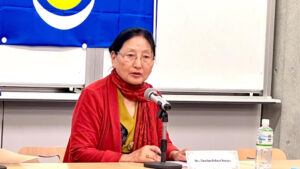 Tokyo, July 09:Tharlam Dolma Changra, Education Minister of the Central Tibetan Administration (CTA) on Monday delivered a poignant address at a seminar held at the University of Tokyo Komaba campus, shedding light on China’s controversial policy of colonial boarding schools aimed at erasing minority national identities.
Tokyo, July 09:Tharlam Dolma Changra, Education Minister of the Central Tibetan Administration (CTA) on Monday delivered a poignant address at a seminar held at the University of Tokyo Komaba campus, shedding light on China’s controversial policy of colonial boarding schools aimed at erasing minority national identities.
“We need to stand together and pressure the Chinese Government to shut down these boarding schools immediately,” Changra asserted, calling for international solidarity across human rights organizations, indigenous communities, lawmakers, and media to challenge China’s policies.
Organized by Tibet House Japan and Save Tibet Network in collaboration with the Minority Nationals Conference (Minzoku Daihyokaigi), the seminar drew a diverse audience including representatives from Japanese parliamentarian support groups, academics, activists, and concerned citizens. Makino Seishu, Chairman of Save Tibet Network, opened the session by emphasizing the urgent need to address China’s systematic eradication of minority identities, languages, and cultural heritage through these boarding schools.
Keynote speakers included Ishii Mitsuko, a Member of Parliament advocating for Tibet and other occupied regions, who pledged parliamentary support to combat China’s coercive assimilation tactics. Education Minister Tharlam Dolma Changra underscored the gravity of China’s actions since its 1950 occupation of Tibet, urging a united global effort to condemn and halt the operation of these boarding schools.
“We need to stand together and pressure the Chinese Government to shut down these boarding schools immediately,” Changra asserted, calling for international solidarity across human rights organizations, indigenous communities, lawmakers, and media to challenge China’s policies.
Dr. Tsewang Gyalpo Arya, representing His Holiness the Dalai Lama’s Liaison Office for Japan and East Asia, supplemented Changra’s remarks with a detailed presentation and testimonial footage illustrating the detrimental impact of these schools on Tibetan children.
The seminar also featured Daichin Olhunud from the Southern Mongolian Congress and Retep Afumet of the Japan Uyghur Association, who shared similar concerns regarding China’s imposition of such schools in their respective regions. Religious leaders Rev. Kobayashi Shuei and Kameda Hirofumi added their voices, urging a collective response to safeguard cultural identities.
The event culminated in a unanimous resolution proposed by Makino Seishu, advocating for parliamentary intervention across affected regions to halt China’s policy. Professor Ako Tomoko of the University of Tokyo concluded with a call for continued dialogue and awareness on the issue.
The seminar highlighted the international scope of concern, with attendees from Japan, China, Mongolia, Taiwan, and Hong Kong engaging in fervent discussions. Kalon T.D. Changra actively engaged with participants, expressing gratitude for their support and exchanging contact information to further collaborate on addressing this critical issue.
Anri Kitazawa of Save Tibet Network moderated the proceedings, ensuring a comprehensive exchange of viewpoints. Copies of the Tibet Action Institute’s report on Chinese colonial boarding schools were distributed, enhancing understanding among attendees.
The seminar underscored a growing international consensus on the need to challenge China’s coercive assimilation policies, marking a pivotal moment in the global discourse on minority rights and cultural preservation.



